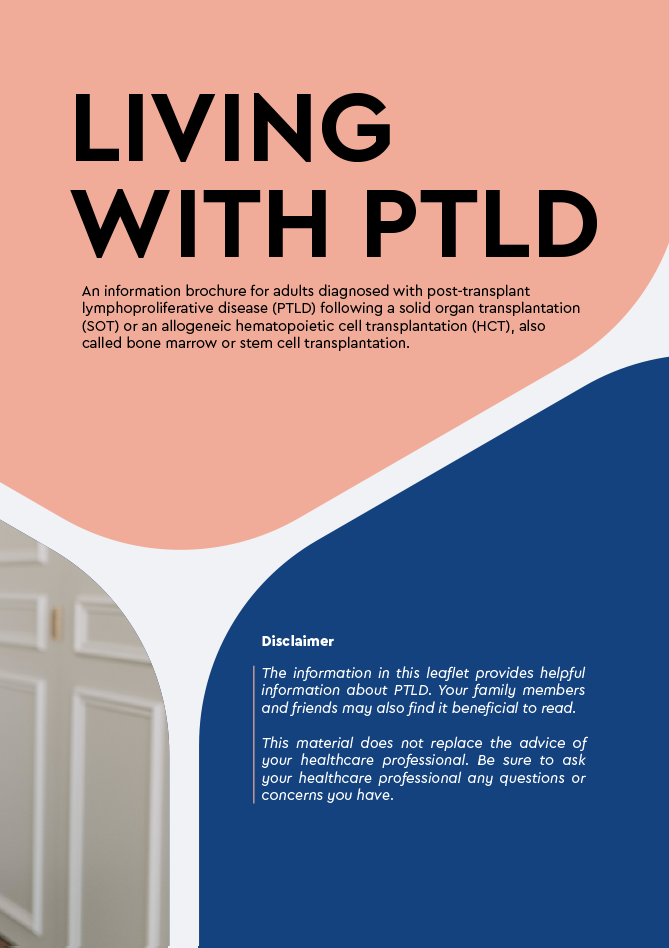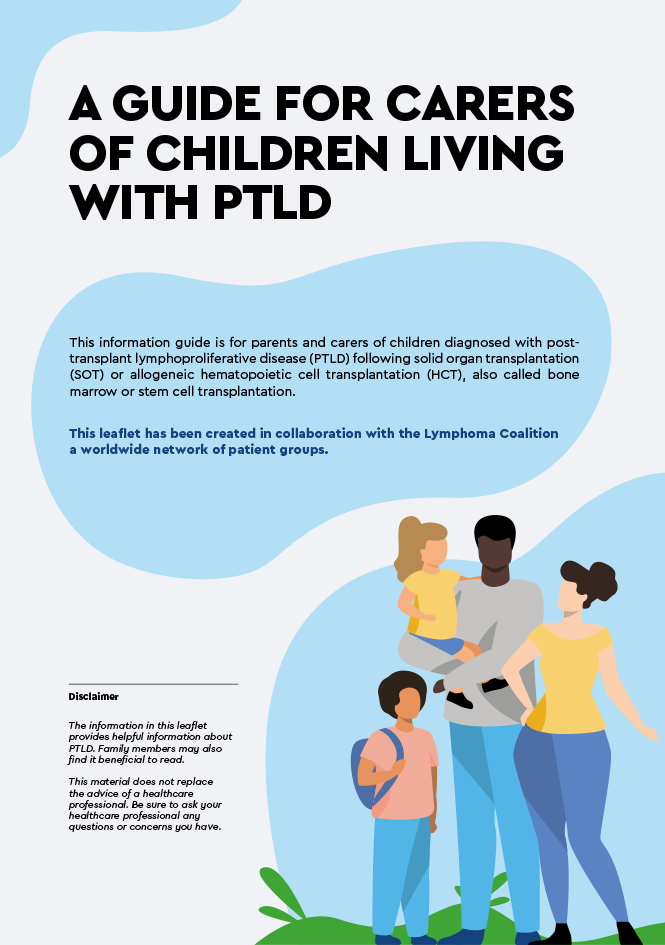Understanding
Post-Transplant Lymphoproliferative Disease

What is PTLD and what does it mean for me?
Post-transplant lymphoproliferative disease (PTLD) is a rare, but well-known complication of solid organ transplants and haematopoietic stem cell transplantation 1. PTLD is related to the Epstein-Barr virus and immunosuppression therapy 2. People who receive such transplants are subsequently treated with medication that suppresses their immune system 3.
How does PTLD occur?
Post-transplant lymphoproliferative disorder (PTLD) is a type of cancer that can develop after a haematopoietic stem cell transplantation (also known as a bone marrow transplant) or after a solid organ transplant.
PTLD is a rare disease.
PTLD is considered a rare disease (i.e. occuring less that 1 in 2,000 patients, based on the official definition of rare disease of the European Union4) which occurs in a small percentage of transplant patients.
PTLD outlook.
Although PTLD can often be successfully treated when diagnosed early5, the disorder can place an additional medical and psychological burden on transplant patients due to its rapid progression.
Immunosuppression.
The compatibility between the donor and the patient, particularly in stem cell transplantation, is an important aspect because it affects the levels of immunosuppression required.
PTLD and EBV.
PTLD is sometimes associated with Epstein-Barr virus (EBV) infection. EBV is a common herpes virus that does not usually cause problems in people with standard immune systems. In immunosuppressed post-transplant patients, however, EBV infection may remain uncontrolled and eventually lead to PTLD6.
Effects of EBV.
PTLD can be caused by reactivation of the patient's EBV or by reactivation of the donor's EBV 7. This causes uncontrolled growth of cells in the patient's lymph nodes and other organs, which can lead to the development of cancer.
Support
Find PTLD patient support near you
Use the interactive map to find relevant PTLD patient group support organisations in your country.
AEAL
AEAL
Avda. de Córdoba, 15 - 2B
28026 - Madrid
Phone: 91 563 18 01
E-Mail: info@aeal.es
Website: https://www.aeal.es
FETCO
FETCO
c/ Isla Cabrera, 38 bajo dcha.
46026 - Valencia
Phone: 600 441 065
E-Mail: info@fetco.es
Website: https://www.fetco.es
La Lampada di Aladino
La Lampada di Aladino
Monza
Phone: 039 882505
E-Mail: info@lampada-aladino.it
Website: https://lampada-aladino.it
BDO – Bundesverband der Organtransplantierten e.V.
BDO – Bundesverband der Organtransplantierten e.V.
Postfach 1126
38711 Seesen
Phone: 05381 4921735
Fax: 05381 4921739
E-Mail: post@bdo-ev.de
Website: www.bdo-ev.de
Hubert Knicker
Hubert Knicker
Wikingerweg 6
32549 Bad Oeynhausen
Phone: 05734-666882
E-Mail: hubert.knicker@web.de
Website: www.Selbsthilfe-fuer-Menschen-vor-und-nach-Organtransplantation.de
Leukämiehilfe RHEIN-MAIN e.V
Leukämiehilfe RHEIN-MAIN e.V
Hasslocher Strasse 118
65428 Rüsselsheim am Main
Phone: 06142 3 22 40
Fax: 06142 17 56 42
E-Mail: buero@lhrm.de
Website: https://www.leukaemiehilfe-rhein-main.de
Sie erreichen uns telefonisch oder per Mail:
Mo – Do: 8:30 – 15:00 Uh, Fr: 8.30 - 12:30 Uhr
Besuche bitte nur nach vorheriger Absprache / Anmeldung
ALCER
ALCER
c/ Constancia, 35
28002 - Madrid
Phone: 915 610 837
E-Mail: informacion@alcer.org
Website: https://alcer.org
FNETH
FNETH
c/ Doctor Castelo, 31 - bajo D
28009 - Madrid
Phone: 917 396 872
E-Mail: secretaria@fneth.org
Website: https://fneth.org
UNIAMO
UNIAMO
Roma
Phone: 06440 4773
Phone: 06455 55179
E-Mail: segreteria@uniamo.org
Website: https://uniamo.org
This website is developed and fully funded by:

This website is intended for patients and carers within the European Union.
This is an international website, targeted to a wide range of audiences (outside the UK
HQ--11-23-2300001 Date of elaboration: March 2024
and ROI). This information is for general informational and educational purposes only.

